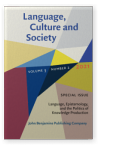Regular article
The making of unaccompanied children
From legal discourse to the everyday
This paper deals with the management of unaccompanied child migration. A legal framework laid out in international law aims to give internationally recognised human rights to children. These legal texts (re)invent the label of “child”, and more specifically, of “unaccompanied child”. This is a legally prescribed lexical label that discursively produces the figure of “child” as a legal, psychological and biometric surveillance object, resulting in ambivalent management of the children. In this paper, I show how this figure of the unaccompanied child is (re)invented in legal texts and then circulates in the humanitarian world via a process of entextualisation on supra/national and local levels in Greece. Drawing on eight months of ethnography on Lesvos Island, I demonstrate the tensions, disruptions, refusals and unsettling moments of struggle that arise when this definition and its related policies are implemented on the ground.
Article outline
- 1.Introduction
- 2.The (speculated) concept of “childhood” and its legal framework
- 3.Recontextualisation of international law in Greece
- 4.Localising the legal framework: Entanglements of care
- 5.Re-localising the legal framework: Frictions between family relations and education
- 6.Imbrication of legal discourse and everyday communicative practices
- Acknowledgements
-
References
